Sherry Parnell's Blog
July 31, 2023
Daughter of the Mountain Coming August 15, 2023
It's been a while since I've been here, but I'm back with huge news. My newest book, DAUGHTER OF THE MOUNTAIN will be on sale on August 15, 2023 and is available RIGHT NOW for preorder. If you read LET THE WILLOWS WEEP or are a fan of family stories and southern fiction, I hope you'll join me on this incredible second book journey.
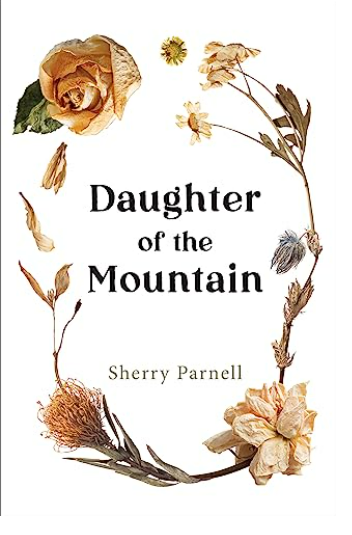
Daughter of the Mountain

Daughter of the Mountain
Published on July 31, 2023 17:24
•
Tags:
new-books, womens-fiction
January 1, 2020
Book Club Favorites
While I'm busy writing, of course I'm a reader first. These books have been some of my favorite book club picks. Please check them out—they are all great conversation starters--and wonderful reads.
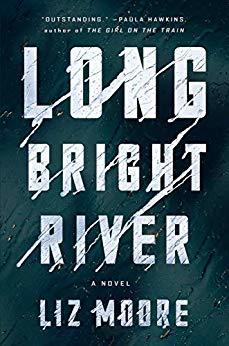
Long Bright River by Liz Moore
Described as “heart pounding and heart wrenching,” I love a novel that absorbs me quickly into the story yet never loses sight of the importance of character.
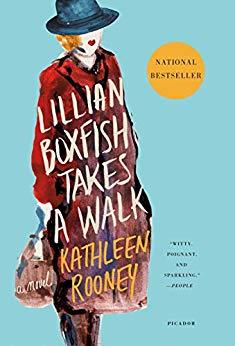
Lillian Boxfish Takes a Walk by Kathleen Rooney
I love that this book promises to walk with the reader not just through New York City in a love letter to the Big Apple, but also promises the reader a glimpse into the ever changing, always evolving times from the Great Depression to the era of hip hop, all painted across the canvas of NYC.
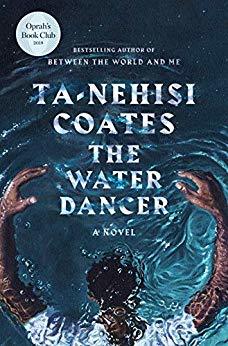
The Water Dancer By Ta-Nehisi Coates
After skimming the first few pages, this novel steeped in evocative language quickly drew me into the world of young Hiram Walker. Although difficult to read about the atrocity of slavery, Hiram Walker’s journey to freedom is one that needed to be told and so needs to be read.
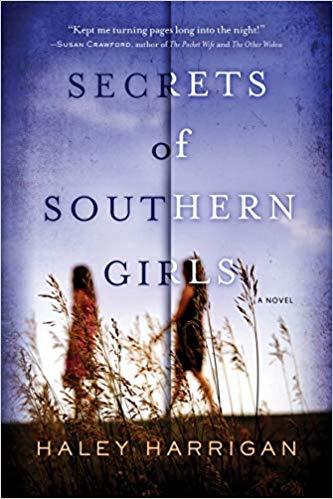
Secrets of the Southern Girls by Haley Harrigan
Part mystery, part coming of age, this novel centers on Julie Portland who accidently kills her best friend then is eventually pulled back to Mississippi to face the secrets and guilt that haunt her. This Southern Lit novel focuses on how one heals from tragedy—a theme that I find fascinating.
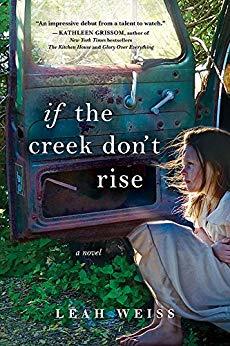
If the Creek Don’t Rise by Leah Weiss
Living in the Appalachian Mountains, Sadie Blue longs to make her mark in the world but living in such poor and challenging conditions makes this desire difficult. Endeared to the fiercely proud and humble people of such southern environs, I love the idea of being drawn into the one that Leah Weiss creates in her novel.
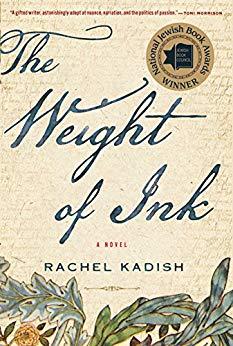
The Weight of Ink by Rachel Kadish
Being an Anglophile, I love that this novel is set in London in both the 1660s and the early twenty-first century. I’m intrigued how the narrative interweaves two intelligent women from separate time periods into a story where sacrifice and choice help determine their fate.
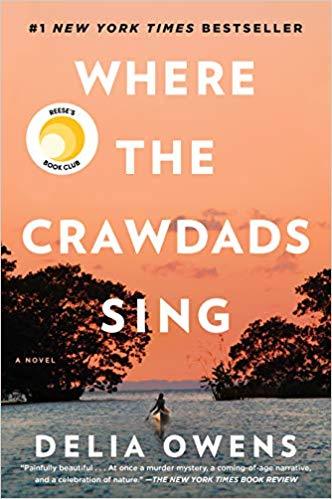
Where the Crawdads Sing
I would be remiss not to choose the book that several have compared to my novel, Let the Willows Weep. Flattered, I am intrigued to find the similarities in our stories. I also can’t resist a coming of age novel set in the beautiful southern landscape.
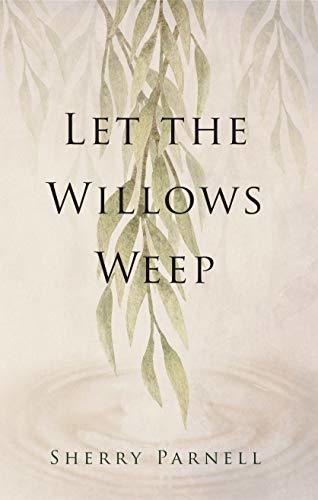
And if you would like to add one more to your own list, my novel Let the Willows Weep was just published in October. If you get a chance, please check it out!

Long Bright River by Liz Moore
Described as “heart pounding and heart wrenching,” I love a novel that absorbs me quickly into the story yet never loses sight of the importance of character.

Lillian Boxfish Takes a Walk by Kathleen Rooney
I love that this book promises to walk with the reader not just through New York City in a love letter to the Big Apple, but also promises the reader a glimpse into the ever changing, always evolving times from the Great Depression to the era of hip hop, all painted across the canvas of NYC.

The Water Dancer By Ta-Nehisi Coates
After skimming the first few pages, this novel steeped in evocative language quickly drew me into the world of young Hiram Walker. Although difficult to read about the atrocity of slavery, Hiram Walker’s journey to freedom is one that needed to be told and so needs to be read.

Secrets of the Southern Girls by Haley Harrigan
Part mystery, part coming of age, this novel centers on Julie Portland who accidently kills her best friend then is eventually pulled back to Mississippi to face the secrets and guilt that haunt her. This Southern Lit novel focuses on how one heals from tragedy—a theme that I find fascinating.

If the Creek Don’t Rise by Leah Weiss
Living in the Appalachian Mountains, Sadie Blue longs to make her mark in the world but living in such poor and challenging conditions makes this desire difficult. Endeared to the fiercely proud and humble people of such southern environs, I love the idea of being drawn into the one that Leah Weiss creates in her novel.

The Weight of Ink by Rachel Kadish
Being an Anglophile, I love that this novel is set in London in both the 1660s and the early twenty-first century. I’m intrigued how the narrative interweaves two intelligent women from separate time periods into a story where sacrifice and choice help determine their fate.

Where the Crawdads Sing
I would be remiss not to choose the book that several have compared to my novel, Let the Willows Weep. Flattered, I am intrigued to find the similarities in our stories. I also can’t resist a coming of age novel set in the beautiful southern landscape.

And if you would like to add one more to your own list, my novel Let the Willows Weep was just published in October. If you get a chance, please check it out!
Published on January 01, 2020 08:04
•
Tags:
book-clubs, books, fiction, historical-fiction, literary-fiction, readers, writers
November 4, 2019
What the Book--and Readers--Deserve
“When the bones are good, the rest don’t matter.” –Maren Moris
I originally published my novel Let the Willows Weep in 2010. Although the book was the best version it could be at the time, I always believed a better version was possible. I knew the bones were good; the story was good, but the rest needed work, and I believe that the “rest” does matter. A rigorous editing of the prose, a cleaner layout and a better cover design is what this book needed and deserved.

So, early last spring I sent my manuscript to a professional editor. Was it unnerving to have my work thoroughly scrutinized and critiqued? Yes. Was it worth it? Absolutely. As writers, we often become too close to our characters, the world we create for them, and the words that form the heartbeat of it all to see the flaws and mistakes. A good editor can spot the weaknesses and suggest changes while still maintaining the writer’s voice. The trick is listening to what they say.
It is sometimes difficult for writers to hear criticism of their work, but I think that for me the passage of time from when I’d originally published the book to this new round of revisiting the text allowed me some separation, and my strong desire to improve my book quieted my ego.
Viewing my work through someone else’s eyes actually improved my vision for my book. I gained a new perspective, which allowed me to add more dimension to my characters and more depth to the plot.
One of my editor’s primary suggestions was that I needed to quicken the pace to draw the readers into the story from the beginning. She also suggested that I make the readers a part of the narrative—"show, don’t tell.” It is the foundation of what we writers are taught and preach, but sometimes we need to be reminded. A good editor will do just that.
These editorial recommendations didn’t compromise my writer’s voice nor undermine the integrity of my story; instead her professional suggestions enhanced my work, making Let the Willows Weep what it needed to be not just for me as the writer but, more importantly, for you as the reader.
As an avid reader myself, I understand the importance of a well-told story, but I also know the importance of how that story is conveyed and packaged. We do judge books by their covers and no one enjoys reading a book with typos, weird fonts, or strange layouts.
So, even when the bones of the book--the story--is good the rest does matter.
And I am so excited to now present to my readership Let the Willows Weep. New and improved, this book is now the best version it, and the readers, deserve for it to be.
I originally published my novel Let the Willows Weep in 2010. Although the book was the best version it could be at the time, I always believed a better version was possible. I knew the bones were good; the story was good, but the rest needed work, and I believe that the “rest” does matter. A rigorous editing of the prose, a cleaner layout and a better cover design is what this book needed and deserved.

So, early last spring I sent my manuscript to a professional editor. Was it unnerving to have my work thoroughly scrutinized and critiqued? Yes. Was it worth it? Absolutely. As writers, we often become too close to our characters, the world we create for them, and the words that form the heartbeat of it all to see the flaws and mistakes. A good editor can spot the weaknesses and suggest changes while still maintaining the writer’s voice. The trick is listening to what they say.
It is sometimes difficult for writers to hear criticism of their work, but I think that for me the passage of time from when I’d originally published the book to this new round of revisiting the text allowed me some separation, and my strong desire to improve my book quieted my ego.
Viewing my work through someone else’s eyes actually improved my vision for my book. I gained a new perspective, which allowed me to add more dimension to my characters and more depth to the plot.
One of my editor’s primary suggestions was that I needed to quicken the pace to draw the readers into the story from the beginning. She also suggested that I make the readers a part of the narrative—"show, don’t tell.” It is the foundation of what we writers are taught and preach, but sometimes we need to be reminded. A good editor will do just that.
These editorial recommendations didn’t compromise my writer’s voice nor undermine the integrity of my story; instead her professional suggestions enhanced my work, making Let the Willows Weep what it needed to be not just for me as the writer but, more importantly, for you as the reader.
As an avid reader myself, I understand the importance of a well-told story, but I also know the importance of how that story is conveyed and packaged. We do judge books by their covers and no one enjoys reading a book with typos, weird fonts, or strange layouts.
So, even when the bones of the book--the story--is good the rest does matter.
And I am so excited to now present to my readership Let the Willows Weep. New and improved, this book is now the best version it, and the readers, deserve for it to be.
Published on November 04, 2019 10:46
•
Tags:
book, editing, literary-fiction, publishing, re-publication, readership, revising, story
March 9, 2016
Breaking The Block
 Whether you’re a professional writer, a student writing a paper, or an executive writing a business proposal, everyone at some point experiences writer’s block. Writer’s block is a condition in which a person is unable to create new work. It varies in severity from mildly annoying causing one to miss a deadline to disastrous causing one to completely abandon his or her work.
Whether you’re a professional writer, a student writing a paper, or an executive writing a business proposal, everyone at some point experiences writer’s block. Writer’s block is a condition in which a person is unable to create new work. It varies in severity from mildly annoying causing one to miss a deadline to disastrous causing one to completely abandon his or her work.Although most everyone is familiar with writer’s block, no one feels it as often or keenly as an author who is under pressure to continually create new and high-quality work. But if as a writer you have been blocked or are currently blocked, take heart, you’re in good company. F. Scott Fitzgerald and Charles Shultz are included among those who have experienced an obstruction in creative flow.
So what do you do when this problem strikes? The solution is different for everyone but I have discovered a few techniques that help.
Read: Read, read, and then when you’re done, read some more. Don’t discriminate in your material because ideas can come from the most unlikely source.
Talk to People: Start conversations with friends, acquaintances, and strangers. Remember, everyone has a story just not everyone can tell it but as a writer, you can.
Use your Senses: Listen, watch, smell, taste and feel. The way the light casts across the sky at sunset or the way chocolate chip cookies release a warm smell mixed with memories can open your senses and your mind.
Use Art to Beget Art: Look at paintings, listen to music, eat delicious foods. Sometimes enjoying and appreciating the art from another field can inspire ideas in your own field. Find inspiration in other artists’ creativity.
Change It Up: When working on a particular piece of work, take it in a different direction. Go against your first idea and instinct. Work against the current and see what it yields.
Stream your Consciousness: Put pen to paper or fingers to keyboard and just write—anything. Allow all your thoughts to flow onto the page. It’s like cleaning out a closet. You will discover what should be pitched and what is worth keeping.
Don’t Write: Sometimes you just need to step away. Allow your mind to relax. Exercise, walk the dog, go to the movies. Allow your mind to concentrate on another task; it is when ideas aren’t forced that they can flow.
Set a Deadline: Whether professionally or self-imposed, deadlines can sometimes force you to work past the block. If self-imposed reward the met deadline to encourage keeping it.
Start with One Word: Choose a word for it’s meaning or it’s sound and begin. The first sentence of my book came from a friend who upon seeing a vibrant red in a picture said that the color was so beautiful, she could swallow it. Remember every book, regardless of length, starts with one word.
Flow: Relax, let go, and allow the words to come. Don’t force it; don’t push it; just flow with it.
As a writer, I understand that writing can be both a passion and a frustration. So give these methods a try and good luck in breaking the block.
February 24, 2016
Fiction. Fun or Functional?
I keenly remember a professor in one of my graduate literature classes asking the students to defend the purpose of fiction. It seemed ironic to me that a person who spent his life teaching fiction would ask others to substantiate it. It was a query he claimed was spawned from his brother’s strong opposition to what he considered a frivolous waste of one’s time, asserting that only nonfiction had any value to one’s intellectual development.
So their sibling rivalry forced me to not only defend but to also question my purpose in reading fiction and more importantly in my desire to write it. Suddenly everyone’s answer including mine seemed very important at that moment because I now was caused to wonder—was fiction simply just for fun or did it have an important function? And this question gave rise to an even more significant question for me—was my writing purposeful or pointless?
We all sat silent for a few moments. We readers of fiction, lovers of make-believe, hopeful writers were stunned. After a few sighs of disbelief and a few groans of indignation, each began his and her individual defense.
The woman in the front row insisted on the transportative powers of good storytelling. After all, many of us had been imprisoned in the Bastille or braved the rough seas aboard the Pequod. A man in the back emphatically defended the transformative power of beautiful prose. True, many of us had been affected or slightly changed by an exquisite passage that made us pause, wanting to live in the beauty of the eighteenth century British countryside or explore the wilds of the Congo.
The protests from us aficionados of literature grew impassioned as we argued that fiction’s purpose is to shape one emotionally, psychologically, and spiritually. We gave examples, we told stories, we offered proof. Except it wasn’t proof as our professor quickly pointed out. His response, we were all begging the question.
Begging the question is a phrase that is commonly misused to mean raising a question; however, it is actually a form of logical fallacy. It is a circular argument in which one’s initial assumption of a statement is considered true without actually proving it. So asserting that fiction affects one emotionally because it makes one feel is simply a restatement of the original premise.
Simply and sadly, he quickly negated our argument and refuted our reasons, invalidating our “proof” that fiction is functional. And he may have been right until science became involved.
“Your Brain on Fiction” by Annie Murphy Paul was published in the New York Times outlining scientific studies, which have provided proof that fiction affects individuals’ brains in more ways than many imagined. Studies are now showing that fiction helps readers feel empathy, develop socially, and have experiences outside of their own life, which enhance one’s growth emotionally and psychologically.
So perhaps the folks in the science department are now learning what we folks in the literature department always knew—fiction isn’t just fun, it functions as a vehicle to teach, transport, and most importantly transform. So grab a good book, curl up and don’t feel a bit of guilt because it isn’t just fun, it’s functional.
Please read this informative article that give us fiction readers and writers props. http://www.nytimes.com/2012/03/18/opi...
So their sibling rivalry forced me to not only defend but to also question my purpose in reading fiction and more importantly in my desire to write it. Suddenly everyone’s answer including mine seemed very important at that moment because I now was caused to wonder—was fiction simply just for fun or did it have an important function? And this question gave rise to an even more significant question for me—was my writing purposeful or pointless?
We all sat silent for a few moments. We readers of fiction, lovers of make-believe, hopeful writers were stunned. After a few sighs of disbelief and a few groans of indignation, each began his and her individual defense.
The woman in the front row insisted on the transportative powers of good storytelling. After all, many of us had been imprisoned in the Bastille or braved the rough seas aboard the Pequod. A man in the back emphatically defended the transformative power of beautiful prose. True, many of us had been affected or slightly changed by an exquisite passage that made us pause, wanting to live in the beauty of the eighteenth century British countryside or explore the wilds of the Congo.
The protests from us aficionados of literature grew impassioned as we argued that fiction’s purpose is to shape one emotionally, psychologically, and spiritually. We gave examples, we told stories, we offered proof. Except it wasn’t proof as our professor quickly pointed out. His response, we were all begging the question.
Begging the question is a phrase that is commonly misused to mean raising a question; however, it is actually a form of logical fallacy. It is a circular argument in which one’s initial assumption of a statement is considered true without actually proving it. So asserting that fiction affects one emotionally because it makes one feel is simply a restatement of the original premise.
Simply and sadly, he quickly negated our argument and refuted our reasons, invalidating our “proof” that fiction is functional. And he may have been right until science became involved.
“Your Brain on Fiction” by Annie Murphy Paul was published in the New York Times outlining scientific studies, which have provided proof that fiction affects individuals’ brains in more ways than many imagined. Studies are now showing that fiction helps readers feel empathy, develop socially, and have experiences outside of their own life, which enhance one’s growth emotionally and psychologically.
So perhaps the folks in the science department are now learning what we folks in the literature department always knew—fiction isn’t just fun, it functions as a vehicle to teach, transport, and most importantly transform. So grab a good book, curl up and don’t feel a bit of guilt because it isn’t just fun, it’s functional.
Please read this informative article that give us fiction readers and writers props. http://www.nytimes.com/2012/03/18/opi...
February 12, 2016
Books To Warm Your Winter Bones
Books To Warm Your Winter Bones
Unless you inhabit a part of the country where the coldest day of winter forces you into a light long-sleeved shirt, you are familiar with hats, gloves, down coats and the hour it takes to get into and out of these layers. Living in the North East, I am intimately acquainted with the Polar Vortex. For most, Polar Vortex is the large pocket of very cold air that sits over the polar region during winter. For me, it is the warm, dark hole I want to crawl into until spring arrives.
Three to five months of enduring mounds of snow, arctic blasts, and bleak skies causes in me the desire--nay, inherent instinct--to pull on baggy sweatpants, curl under a pile of soft blankets, sip warm tea, and read a good book.
The dilemma arises when after brewing the perfect cup of tea, I reach for a book or rather attempt to download a book and I draw a blank. As a mom, it's frustrating to spend my few precious moments of solitude scrolling through endless literary options without ever reading a word.
So, I decided to revisit some reading lists from school.
Remember those lists? I have spoken to some people about the reading lists from their school days and I discovered that many dreaded and/or disregarded the books. One person told me that she was too busy with sports. Another said he was a slow reader and couldn’t finish all the books. And a couple of people said they just assumed that the books would be boring, after all a teacher assigned them. I realized that a lot of people have missed out on some great reads.
So, I decided to create a reading list for you. Although I supply my reasoning for these choices, they are still my opinion and I welcome you to add your own to this list. The following are in no particular order and by no means complete but it’s a good place to begin. After all, winter seems the perfect opportunity to burrow in and discover some missed classics.
1. Anything by Shakespeare
Because, although daunting and intimidating, it’s so worth it. It is literature that when read and understood astounds with emotion and significance that transcends the years since it’s been written.
2. “Frankenstein” by Mary Shelley
Because isn’t it time that you stop calling the monster Frankenstein and believing that two big bolts are an integral part of the plot? And because it’s a beautiful story about humanity and people’s greedy lust to play God.
3. “Emma” by Jane Austen
Because this story is a smart romantic comedy, which feels as light and fun as a movie with its mishaps of romance yet is nuanced with real issues such as that of marriage and its affect on class.
4. “Jane Eyre” by Charlotte Bronte
Because it’s a story about adversity, struggle and sacrifice rewarded with a love hard won set in a forbidding mansion with a handsome and mysterious man. Who doesn’t love handsome and mysterious? Great gothic read.
5. “To Kill a Mockingbird” by Harper Lee
Because this story explores the difficult topics of class, race and gender roles and although set in the American Deep South in the late thirties these are subjects still in need of further discussion. In addition, the story gives the readers a hero who is moral, compassionate and courageous—a necessity in a world where there are always wrongs to be righted.
6. “Death of a Salesman” by Arthur Miller
Because if you’ve experienced dreams unrealized, hopes dashed, felt disappointment in others, and longed for more than you have then you will not only sympathize with Willy Loman, you will understand him.
7. “The Grapes of Wrath” by John Steinbeck
Because it is a story of struggle and hardship and the endurance of the human spirit played out in a family whose bond goes beyond blood—A family who struggles and loses their home due to economic hardship (a story heard often today). It teaches that it is not the condition of the weather (the drought) or the economy but the condition of man that affects our state of being. If we stop separating ourselves from one another, we learn we are stronger unified.
8. “Complete Stories and Poems of Edgar Allen Poe” by Edgar Allen Poe
Because if you love the thrill of a mystery, the fright of a horror tale and the joy of a well-crafted story then you will delight in Poe’s writing. He is a master craftsman in creating stories that shock, scare and keep you thinking about them long after the book is closed.
9. “The Sound and the Fury” by William Faulkner
Because it is about the dissolution of family and a truth that is never known because everyone’s version of that truth is unreliable and changeable—just like that of most families.
10. “Beloved” by Toni Morrison
Because it’s a story about a mother’s sacrifice for her child in a time of limited options and how one’s choice can “haunt” us long after it’s made. And most importantly the story’s theme of love and forgiveness is timeless.
So I hope this list provides a few good suggestions.
And although it was never on a list you missed in school, perhaps you could also consider my book, “Let the Willows Weep."
Unless you inhabit a part of the country where the coldest day of winter forces you into a light long-sleeved shirt, you are familiar with hats, gloves, down coats and the hour it takes to get into and out of these layers. Living in the North East, I am intimately acquainted with the Polar Vortex. For most, Polar Vortex is the large pocket of very cold air that sits over the polar region during winter. For me, it is the warm, dark hole I want to crawl into until spring arrives.
Three to five months of enduring mounds of snow, arctic blasts, and bleak skies causes in me the desire--nay, inherent instinct--to pull on baggy sweatpants, curl under a pile of soft blankets, sip warm tea, and read a good book.
The dilemma arises when after brewing the perfect cup of tea, I reach for a book or rather attempt to download a book and I draw a blank. As a mom, it's frustrating to spend my few precious moments of solitude scrolling through endless literary options without ever reading a word.
So, I decided to revisit some reading lists from school.
Remember those lists? I have spoken to some people about the reading lists from their school days and I discovered that many dreaded and/or disregarded the books. One person told me that she was too busy with sports. Another said he was a slow reader and couldn’t finish all the books. And a couple of people said they just assumed that the books would be boring, after all a teacher assigned them. I realized that a lot of people have missed out on some great reads.
So, I decided to create a reading list for you. Although I supply my reasoning for these choices, they are still my opinion and I welcome you to add your own to this list. The following are in no particular order and by no means complete but it’s a good place to begin. After all, winter seems the perfect opportunity to burrow in and discover some missed classics.
1. Anything by Shakespeare
Because, although daunting and intimidating, it’s so worth it. It is literature that when read and understood astounds with emotion and significance that transcends the years since it’s been written.
2. “Frankenstein” by Mary Shelley
Because isn’t it time that you stop calling the monster Frankenstein and believing that two big bolts are an integral part of the plot? And because it’s a beautiful story about humanity and people’s greedy lust to play God.
3. “Emma” by Jane Austen
Because this story is a smart romantic comedy, which feels as light and fun as a movie with its mishaps of romance yet is nuanced with real issues such as that of marriage and its affect on class.
4. “Jane Eyre” by Charlotte Bronte
Because it’s a story about adversity, struggle and sacrifice rewarded with a love hard won set in a forbidding mansion with a handsome and mysterious man. Who doesn’t love handsome and mysterious? Great gothic read.
5. “To Kill a Mockingbird” by Harper Lee
Because this story explores the difficult topics of class, race and gender roles and although set in the American Deep South in the late thirties these are subjects still in need of further discussion. In addition, the story gives the readers a hero who is moral, compassionate and courageous—a necessity in a world where there are always wrongs to be righted.
6. “Death of a Salesman” by Arthur Miller
Because if you’ve experienced dreams unrealized, hopes dashed, felt disappointment in others, and longed for more than you have then you will not only sympathize with Willy Loman, you will understand him.
7. “The Grapes of Wrath” by John Steinbeck
Because it is a story of struggle and hardship and the endurance of the human spirit played out in a family whose bond goes beyond blood—A family who struggles and loses their home due to economic hardship (a story heard often today). It teaches that it is not the condition of the weather (the drought) or the economy but the condition of man that affects our state of being. If we stop separating ourselves from one another, we learn we are stronger unified.
8. “Complete Stories and Poems of Edgar Allen Poe” by Edgar Allen Poe
Because if you love the thrill of a mystery, the fright of a horror tale and the joy of a well-crafted story then you will delight in Poe’s writing. He is a master craftsman in creating stories that shock, scare and keep you thinking about them long after the book is closed.
9. “The Sound and the Fury” by William Faulkner
Because it is about the dissolution of family and a truth that is never known because everyone’s version of that truth is unreliable and changeable—just like that of most families.
10. “Beloved” by Toni Morrison
Because it’s a story about a mother’s sacrifice for her child in a time of limited options and how one’s choice can “haunt” us long after it’s made. And most importantly the story’s theme of love and forgiveness is timeless.
So I hope this list provides a few good suggestions.
And although it was never on a list you missed in school, perhaps you could also consider my book, “Let the Willows Weep."
Published on February 12, 2016 04:42
•
Tags:
book-reviews, books, writers
February 5, 2016
If You Give a Writer the Internet
Last night, I read to my son Laura Numeroff's book, "If You Take A Mouse To The Movies". We both love this book but I imagine for different reasons. We mutually enjoy the Christmas theme. But while my son loves the colorful illustrations and cute mouse, I appreciate the mouse's proclivity for having every thought induce a new idea.
After ordering popcorn at the movies, the mouse wants to string it together. He then wants to hang it on a Christmas tree so he has to buy a tree. After buying the tree, he sees a snowman and wants to build one. The story continues with each activity producing the idea for another new endeavor until, after stringing the popcorn, the mouse is reminded that he wants to go to the movies.
A few might call this mouse endearingly indecisive, some may diagnose him with ADD, and many might say he is scatterbrained. After all, he seems to possess a mind that meanders, causing every idea to produce a new one prompting him to undertake another activity. I would disagree, arguing that this adorable little rodent is demonstrating how everything we do prompts us to try something else. It is a simple illustration of cause and effect. It is also a thought process with which I am very familiar.
I am a very organized person. I have plans and strategies to accomplish these plans. I have lists and lists of lists. I complete many tasks with laser focus but I am also a writer and creative types have a propensity for popcorn thoughts. "Popcorning", a term coined by my husband, is when I get so excited by an idea that twenty more ideas "popcorn" from the original one, muddling my thought process and my progress.
Read about a day in my life and see how I am like this adorably easily distractible mouse.
I start my workday by beginning to write my second book, but as I do I think about how I need to market my first book. So I open up my Internet browser and search for marketing articles. The first article has ten good tips for book promotion. The second tip proclaims Twitter to be a successful means of marketing, so I log onto Twitter. I send a tweet, but then I read on the newsfeed about an article that heralds the benefits of Facebook. So I log onto Facebook where I try to post a review of my book, but the link won't work. I Google how to post links and an article about advertising books for free pops up. I click onto this article and find a link to a website where you can post a synopsis of your book for free. I go to this website where I read an interview with an author who writes about her love and passion for writing. I am reminded of how much I love to write so I minimize my web page and maximize my word document and begin to write my second book.
So it seems just like you can't take a mouse to the movies without him wanting popcorn, you can't give a writer the Internet without her wanting to write.
After ordering popcorn at the movies, the mouse wants to string it together. He then wants to hang it on a Christmas tree so he has to buy a tree. After buying the tree, he sees a snowman and wants to build one. The story continues with each activity producing the idea for another new endeavor until, after stringing the popcorn, the mouse is reminded that he wants to go to the movies.
A few might call this mouse endearingly indecisive, some may diagnose him with ADD, and many might say he is scatterbrained. After all, he seems to possess a mind that meanders, causing every idea to produce a new one prompting him to undertake another activity. I would disagree, arguing that this adorable little rodent is demonstrating how everything we do prompts us to try something else. It is a simple illustration of cause and effect. It is also a thought process with which I am very familiar.
I am a very organized person. I have plans and strategies to accomplish these plans. I have lists and lists of lists. I complete many tasks with laser focus but I am also a writer and creative types have a propensity for popcorn thoughts. "Popcorning", a term coined by my husband, is when I get so excited by an idea that twenty more ideas "popcorn" from the original one, muddling my thought process and my progress.
Read about a day in my life and see how I am like this adorably easily distractible mouse.
I start my workday by beginning to write my second book, but as I do I think about how I need to market my first book. So I open up my Internet browser and search for marketing articles. The first article has ten good tips for book promotion. The second tip proclaims Twitter to be a successful means of marketing, so I log onto Twitter. I send a tweet, but then I read on the newsfeed about an article that heralds the benefits of Facebook. So I log onto Facebook where I try to post a review of my book, but the link won't work. I Google how to post links and an article about advertising books for free pops up. I click onto this article and find a link to a website where you can post a synopsis of your book for free. I go to this website where I read an interview with an author who writes about her love and passion for writing. I am reminded of how much I love to write so I minimize my web page and maximize my word document and begin to write my second book.
So it seems just like you can't take a mouse to the movies without him wanting popcorn, you can't give a writer the Internet without her wanting to write.
Published on February 05, 2016 11:31
•
Tags:
writer
January 10, 2016
Currier And Ives Kids
From December 23, 2015
They stood before me as I inspected them from head to toe. They each wore bright red and green coordinating Christmas sweaters and pressed tan pants; their hair neatly combed was still slick against their freshly scrubbed little foreheads. Their smiles widened as I told them how handsome they looked and they did; they were picture perfect. The whole day was going to be picture perfect I mused to myself as they bounded away with energy unable to be contained in small bodies.
I followed them down the stairs, happily singing out our plans. In the kitchen, I packed snacks and drinks into a lunch bag as I reviewed the details of the day with my husband. Humming Christmas songs, I loaded the car with special stuffed animals and toys in my effort to preempt any possible meltdowns or tantrums; not that I believed this would happen. Most mothers don't. We naively believe--every time--that this day will be the perfect day.
Deep down we mothers know both intuitively and from hard-won experience know that a day at the pumpkin patch will most likely end with an unfortunate gourd being hurtled across the field by an overly hungry, angry child. And we know that the visit to Santa will probably end with a swift kick to Santa's shins followed by a toddler writhing on the floor in a tantrum. However, we hold firmly to our romanticized version of Currier and Ives kids.
Why do we do it? I personally believe that this deeply rooted fallacy exists for the purpose of procreation. However, superficially it may just be that people, in general, want perfection; a perfect moment captured in a glossy photo. Perhaps we believe that joy can only be discovered when things don't go wrong, sideways, or not how we planned.
If we are honest though it is the pictures of the squirming child and the boy with a chocolate-smeared grin that make us smile. The moments that are remembered most fondly are the Santa shin-kicking, gourd throwing, writhing on the ground times--the messy moments. This is because life--real life-- is messy.
It is full of scrapes, tantrums, falling down, getting up and following again. Photograph it, remember it, embrace it. Although the Currier and Ives kids may be perfectly coiffed, scarves wrapped neatly, tiny hands holding sleds steady, it isn't what makes life memorable, meaningful and wonderful.
And as art imitates life, the characters in our novels shouldn't be picture perfect either. Of course unlike a two-year old with boundless energy and a strong will, we writers can control our characters. However, we must restrain ourselves from creating what we believe, want or wish individuals and life to be for we risk constructing characters and stories that are one-dimensional.
Just as the unexpected and unplanned events make life more interesting so too are our characters made more interesting when we don't over-engineer them. We writers must be cautious to not create characters in the image of our idea of a person but rather in the image of what a person truly is, including the peccadilloes, eccentricities, and faults.
Writers just as parents must allow their characters like children to express themselves, push their boundaries, and allow their curiosity to blossom. After all as writers we aren't much different from parents. Just as with children, we create our characters, shape them, love them and hope that we have endowed them with what they need to thrive in the world.
They stood before me as I inspected them from head to toe. They each wore bright red and green coordinating Christmas sweaters and pressed tan pants; their hair neatly combed was still slick against their freshly scrubbed little foreheads. Their smiles widened as I told them how handsome they looked and they did; they were picture perfect. The whole day was going to be picture perfect I mused to myself as they bounded away with energy unable to be contained in small bodies.
I followed them down the stairs, happily singing out our plans. In the kitchen, I packed snacks and drinks into a lunch bag as I reviewed the details of the day with my husband. Humming Christmas songs, I loaded the car with special stuffed animals and toys in my effort to preempt any possible meltdowns or tantrums; not that I believed this would happen. Most mothers don't. We naively believe--every time--that this day will be the perfect day.
Deep down we mothers know both intuitively and from hard-won experience know that a day at the pumpkin patch will most likely end with an unfortunate gourd being hurtled across the field by an overly hungry, angry child. And we know that the visit to Santa will probably end with a swift kick to Santa's shins followed by a toddler writhing on the floor in a tantrum. However, we hold firmly to our romanticized version of Currier and Ives kids.
Why do we do it? I personally believe that this deeply rooted fallacy exists for the purpose of procreation. However, superficially it may just be that people, in general, want perfection; a perfect moment captured in a glossy photo. Perhaps we believe that joy can only be discovered when things don't go wrong, sideways, or not how we planned.
If we are honest though it is the pictures of the squirming child and the boy with a chocolate-smeared grin that make us smile. The moments that are remembered most fondly are the Santa shin-kicking, gourd throwing, writhing on the ground times--the messy moments. This is because life--real life-- is messy.
It is full of scrapes, tantrums, falling down, getting up and following again. Photograph it, remember it, embrace it. Although the Currier and Ives kids may be perfectly coiffed, scarves wrapped neatly, tiny hands holding sleds steady, it isn't what makes life memorable, meaningful and wonderful.
And as art imitates life, the characters in our novels shouldn't be picture perfect either. Of course unlike a two-year old with boundless energy and a strong will, we writers can control our characters. However, we must restrain ourselves from creating what we believe, want or wish individuals and life to be for we risk constructing characters and stories that are one-dimensional.
Just as the unexpected and unplanned events make life more interesting so too are our characters made more interesting when we don't over-engineer them. We writers must be cautious to not create characters in the image of our idea of a person but rather in the image of what a person truly is, including the peccadilloes, eccentricities, and faults.
Writers just as parents must allow their characters like children to express themselves, push their boundaries, and allow their curiosity to blossom. After all as writers we aren't much different from parents. Just as with children, we create our characters, shape them, love them and hope that we have endowed them with what they need to thrive in the world.
Published on January 10, 2016 07:25
No, Not that Turkey
From November 23, 2015
Unless the rows of canned pumpkin or the thousand ways to baste a turkey on Pinterest have escaped your attention, you know that Thanksgiving is coming--soon.
Before you begin salivating as you picture glossy green beans and perfectly baked pumpkin pie, I want to talk about Turkey. No not that turkey.
During my year abroad in 1995, two of my friends and I decided to go to Turkey during our vacation. The choice of country was purely based on the procurement of cheap airline tickets. At the time, I didn't know anything about Turkey. During my stay, I learned a bit about their culture and traditions and after visiting several small towns, I learned more about the people. My greatest lesson learned, however, was during that first cab ride from the airport to our hotel.
Speaking no English, the driver patiently listened to our enunciations of the hotel's name as he watched our wild gesticulations as we tried to make our point clear. Nodding, he wheeled out of the parking lot; our heads knocked against the back of the seats. Soon roads, narrow and without safety guards, ascending steeply. He swerved wildly around the bends at an unsettling speed. Looking out the window I could see that all that lay between sudden death and us was his unaccounted for skill and some gravel.
After what seemed like an interminable amount of time, the driver pulled onto a beach; it was desolate and very dark. He shut off the car. He said nothing. He reached into his glove box and pulled out something, which he quickly slipped into his pocket.
He then motioned for us to get out. Afraid, I slowly opened the car door and stepped onto the mushy sand. I was certain at this point that he was going to kill us all, execution-style. Getting out of the car, he stood before us as I waited for him to pull his imagined handgun from his pocket and shoot us. Instead, he again gestured for us to follow him.
We walked a few yards to a bench. He pointed. We sat. He walked away. Saying nothing, we waited. Soon he came back holding four small ice-cream cones. He handed one to each of us then sat down. My friends and I exchanged confused looks. He smiled. Side by side, in silence, we ate our ice cream
It is often our perception that shapes our opinions. Consequently our measurement of another is limited to our own scope. It's only when we expand our capacity to appreciate another that we have the opportunity to reach a common understanding.
In awe of a stranger's kind gesture, I don't know how long we sat. It was long enough for me to no longer be afraid. It was also long enough for me to realize that despite all our differences, we were fundamentally the same. Regardless of our age, religion, culture or language, we all feel. Emotion is the essential element that bonds each of us together. Be it the fear of the unknown or the happiness of eating ice cream.
It is not only an important life lesson; it is an important lesson for writers. When creating characters, the first step before trying on a new color or culture or gender is to imbue those characters with the vital element of humanity--emotion.
It's only when readers can empathize with the characters that their perception shifts and in doing so, their capacity to understand increases as does their willingness to accept. It is in this way that we each learn what a stranger taught me with the kind and simple gift of an ice cream cone--we are equal in our hearts even when we perceive ourselves to be different in every other way.
I am grateful for having learned this lesson for my hope is that it has not only made me a better writer but also a better person.
Unless the rows of canned pumpkin or the thousand ways to baste a turkey on Pinterest have escaped your attention, you know that Thanksgiving is coming--soon.
Before you begin salivating as you picture glossy green beans and perfectly baked pumpkin pie, I want to talk about Turkey. No not that turkey.
During my year abroad in 1995, two of my friends and I decided to go to Turkey during our vacation. The choice of country was purely based on the procurement of cheap airline tickets. At the time, I didn't know anything about Turkey. During my stay, I learned a bit about their culture and traditions and after visiting several small towns, I learned more about the people. My greatest lesson learned, however, was during that first cab ride from the airport to our hotel.
Speaking no English, the driver patiently listened to our enunciations of the hotel's name as he watched our wild gesticulations as we tried to make our point clear. Nodding, he wheeled out of the parking lot; our heads knocked against the back of the seats. Soon roads, narrow and without safety guards, ascending steeply. He swerved wildly around the bends at an unsettling speed. Looking out the window I could see that all that lay between sudden death and us was his unaccounted for skill and some gravel.
After what seemed like an interminable amount of time, the driver pulled onto a beach; it was desolate and very dark. He shut off the car. He said nothing. He reached into his glove box and pulled out something, which he quickly slipped into his pocket.
He then motioned for us to get out. Afraid, I slowly opened the car door and stepped onto the mushy sand. I was certain at this point that he was going to kill us all, execution-style. Getting out of the car, he stood before us as I waited for him to pull his imagined handgun from his pocket and shoot us. Instead, he again gestured for us to follow him.
We walked a few yards to a bench. He pointed. We sat. He walked away. Saying nothing, we waited. Soon he came back holding four small ice-cream cones. He handed one to each of us then sat down. My friends and I exchanged confused looks. He smiled. Side by side, in silence, we ate our ice cream
It is often our perception that shapes our opinions. Consequently our measurement of another is limited to our own scope. It's only when we expand our capacity to appreciate another that we have the opportunity to reach a common understanding.
In awe of a stranger's kind gesture, I don't know how long we sat. It was long enough for me to no longer be afraid. It was also long enough for me to realize that despite all our differences, we were fundamentally the same. Regardless of our age, religion, culture or language, we all feel. Emotion is the essential element that bonds each of us together. Be it the fear of the unknown or the happiness of eating ice cream.
It is not only an important life lesson; it is an important lesson for writers. When creating characters, the first step before trying on a new color or culture or gender is to imbue those characters with the vital element of humanity--emotion.
It's only when readers can empathize with the characters that their perception shifts and in doing so, their capacity to understand increases as does their willingness to accept. It is in this way that we each learn what a stranger taught me with the kind and simple gift of an ice cream cone--we are equal in our hearts even when we perceive ourselves to be different in every other way.
I am grateful for having learned this lesson for my hope is that it has not only made me a better writer but also a better person.
Published on January 10, 2016 07:11



